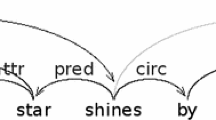Abstract
We are interested in the differences between how a human agent and a logic-based software agent interpret a text in natural language. When reading a narrative, the human agent has a single interpretation model. That is the preferred model among the models consistent with the available information. The model is gradually adjusted as the story proceeds. Differently, a logic-based software agent works with a finite set of many models, in the same time. Of most interest is that the number of these models is huge, even for simple narratives. We compare here the reduction strategies of humans and software agents to keep the discourse more intelligible and tractable. One the one hand, the human agent extensively uses common knowledge, contextual reasoning and closes the world as much as possible. On the other hand, the logical agent adds domain knowledge (such as ontologies) and applied reduction strategies (such as identifying isomorphisms). The differences are analyse with puzzles in First order logic, Description logic and Dynamic epistemic logic.
This research is part-funded by the ExNanoMat-21PFE grant.
Access this chapter
Tax calculation will be finalised at checkout
Purchases are for personal use only
Similar content being viewed by others
Notes
- 1.
We assume the reader is familiar with the Description Logic syntax. Otherwise, the reader is referred to [1].
- 2.
For one implementation of this puzzle, the interested reader is referred to SMCDEL symbolic model checker for Dynamic Epistemic Logic (https://github.com/jrclogic/SMCDEL) [2].
- 3.
- 4.
References
Baader, F., Calvanese, D., McGuinness, D., Patel-Schneider, P., Nardi, D.: The Description Logic Handbook: Theory, Implementation and Applications. Cambridge University Press, Cambridge (2003)
van Benthem, J., van Eijck, J., Gattinger, M., Su, K.: Symbolic model checking for dynamic epistemic logic—S5 and beyond. J. Logic Comput. 28(2), 367–402 (2017)
De Bono, E., Zimbalist, E.: Lateral thinking. Viking (2010)
Gangemi, A., Presutti, V., Recupero, D.R., Nuzzolese, A.G., Draicchio, F., Mongiovì, M.: Semantic web machine reading with FRED. Semant. Web 8(6), 873–893 (2017)
Garrette, D., Klein, E.: An extensible toolkit for computational semantics. In: Proceedings of the Eighth International Conference on Computational Semantics, pp. 116–127. Association for Computational Linguistics (2009)
Haarslev, V., Hidde, K., Möller, R., Wessel, M.: The RacerPro knowledge representation and reasoning system. Semant. Web 3(3), 267–277 (2012)
Herman, D.: Story Logic: Problems and Possibilities of Narrative. University of Nebraska Press, Lincoln (2004)
Kamp, H., Reyle, U.: From Discourse to Logic: Introduction to Model Theoretic Semantics of Natural Language, Formal Logic and Discourse Representation Theory, vol. 42. Springer, Dordrecht (2013)
Letia, I.A., Groza, A.: Modelling imprecise arguments in description logic. Adv. Electr. Comput. Eng. 9(3), 94–99 (2009)
McCune, W.: Mace4 reference manual and guide. arXiv preprint cs/0310055 (2003)
Mueller, E.T.: Commonsense Reasoning: An Event Calculus Based Approach. Morgan Kaufmann, Burlington (2014)
Van Ditmarsch, H., van Der Hoek, W., Kooi, B.: Dynamic Epistemic Logic, vol. 337. Springer, Dordrecht (2007). https://doi.org/10.1007/978-1-4020-5839-4
Author information
Authors and Affiliations
Corresponding author
Editor information
Editors and Affiliations
Rights and permissions
Copyright information
© 2020 Springer Nature Switzerland AG
About this paper
Cite this paper
Groza, A. (2020). On the Differences Between Human Agents and Logic-Based Software Agents Discourse Understanding. In: B. R., P., Thenkanidiyoor, V., Prasath, R., Vanga, O. (eds) Mining Intelligence and Knowledge Exploration. MIKE 2019. Lecture Notes in Computer Science(), vol 11987. Springer, Cham. https://doi.org/10.1007/978-3-030-66187-8_1
Download citation
DOI: https://doi.org/10.1007/978-3-030-66187-8_1
Published:
Publisher Name: Springer, Cham
Print ISBN: 978-3-030-66186-1
Online ISBN: 978-3-030-66187-8
eBook Packages: Computer ScienceComputer Science (R0)




